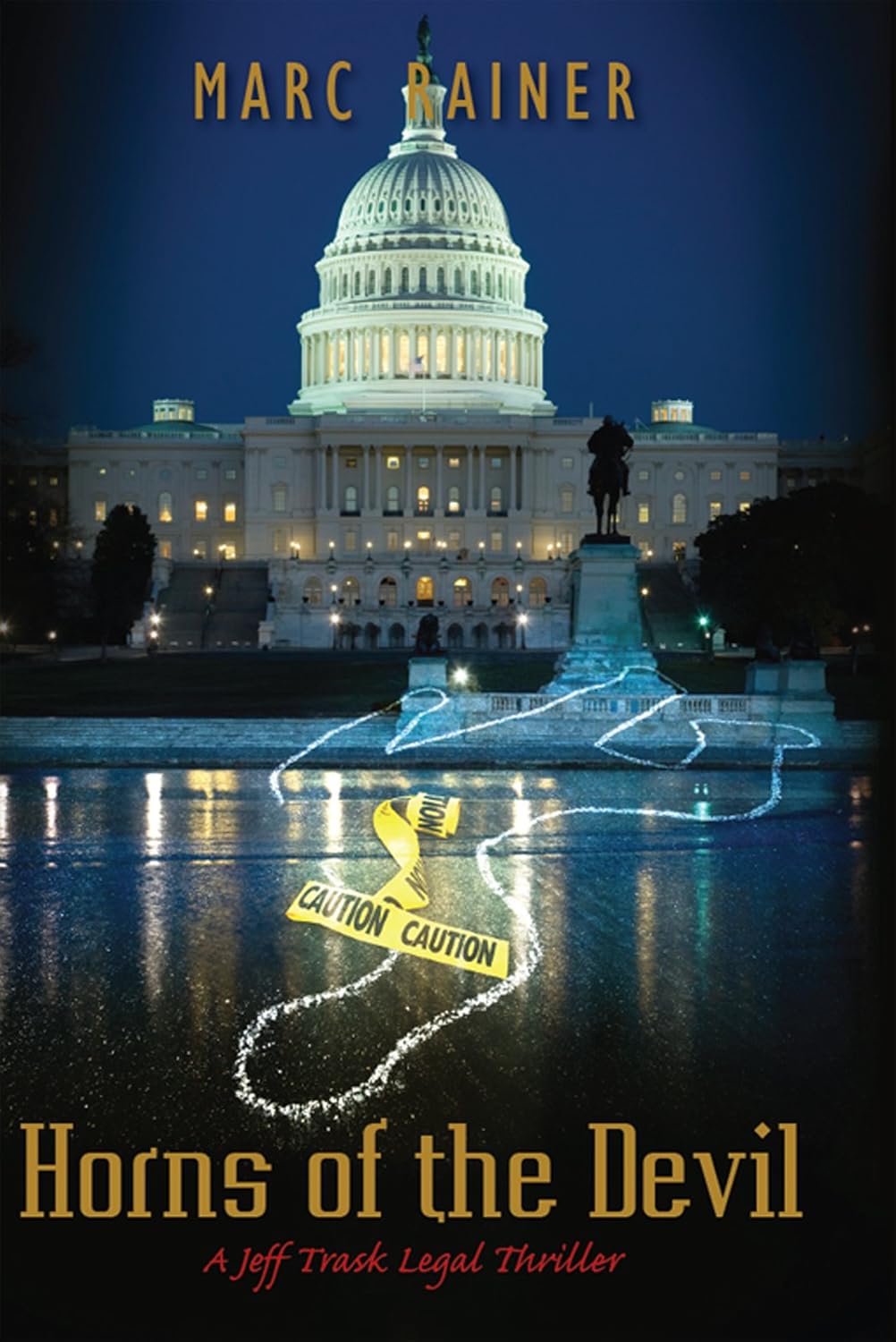
Good morning, Marc. Thank you for joining us here today to talk about your Jeff Trask series of crime drama novels.
Capital Kill was your first novel, and Horns of the Devil being your second in the series. Besides legal briefs, were these your first attempts at writing?
Capital Kill was my first novel. I had previously co-authored a book published by the American Bar Association on how to try murder cases.
Like your main character, Jeff Trask, you were also a JAG prosecutor and an Assistant United States Attorney. Can you tell us a little about your time as a prosecutor in Washington, D.C.?
Of course. As you’ve recognized, Jeff and I – while not the same person – have shared a lot of experiences. Because of all my trial experience (five years and almost 200 cases) as a traveling Air Force JAG prosecutor, I was “fast-tracked” when I got to the U.S. Attorney’s Office in Washington. I did work for short stints in all the local court rotations there before moving up to the federal court cases. It’s an unusual office, because DC is a federal enclave, and the federal prosecutors there have to handle all the local “street crime” – cases that in other areas would be tried by state or local prosecutors. Between my JAG time and the DC local court time, I tried every kind of case you could think of – robberies assaults, rapes, murders – before moving up to the federal court and handling large conspiracy cases.
Your story explains several interesting facts about working in Washington, D.C., such as how hard it is for the various agencies, including the Metro Police, FBI, CIA, DEA, etc., to keep from tripping over each other in their investigations, and how important it is for these agencies to work in conjunction with each other. But in a City like D.C., where the egos are more inflated than Hollywood, was this always easy to accomplish, or was important information hoarded by the different agencies?
It depended upon the agencies and the personalities working on a given case. When I worked there, FBI and DEA were at war, and wouldn’t talk to each other. It was stupid and silly, letting those mega-egos get in the way. It made it more difficult to go after the real bad guys. There was a good deal of information hoarding, and one incident – told fictionally in Capital Kill – actually happened. One federal agency broke into a task force office and removed another agency’s investigative files. I had to send the US Marshals over to this agency’s office with a subpoena to get our own files back.
You story shows that the cases tried in Federal Court involve a more ruthless and dangerous level of criminals. Did you ever find yourself at real risk while working as an AUSA?
Rarely, but it does happen. I had to dig a couple of 9mm rounds out of the siding of my house on one occasion. Until I saw them, I never even knew those shots had been fired. One bullet might have been a random occurrence or an accident. Two – I don’t think so. We have had federal prosecutors, and recently several state prosecutors, killed on the streets and in their homes. I’m hopeful that Congress and the Department of Justice will recognize that prosecutors, while not on the front lines, are occasionally in the line of fire, and should be recognized as full-fledged law enforcement officers and authorized to carry weapons. I also hope that the National Law Enforcement Officers Memorial in Washington will recognize this fact, and will include the names of fallen prosecutors on the Memorial.
You introduce us to your characters by simply putting them to work. In the real world, there is no focusing on one case. We follow Jeff Trask and the police through various smaller cases while they are working on the major story plot. Did most of your work as an actual prosecutor involve working closely with the police and FBI on a day to day basis?
Always. You are almost never working on “just one case,” unless it’s immediately before trial or unless it’s a huge matter that demands an investigative team’s undivided attention. The bad guys are always doing their thing, so you have be reacting to whatever new cases come in your door, while working on the ones already assigned to you. You’ll be doing search warrants and arrests on one case while getting another ready for a trial that might be weeks away. It’s not like TV, where the case of the hour gets all the focus, and lab results are back in five minutes.

In your latest novel, Horns of the Devil, which was just released and your third novel, The White Horse of Death, which will be released later this year, will we be working with the same task force or will you be introducing us to new characters?
The central characters in the task force will still be there, and others will be introduced also. That’s the way it works in real life. Prosecutors develop relationships and trust factors with certain investigators, and vice-versa. It’s teamwork. I’ve tried to make these books as realistic as I can, while holding the readers’ interest. You won’t find comic-book style lone rangers walking around solving major cases all by their lonesome, or snap-shooting a bad guy off a roof a mile away with a handgun, or out-running machine gun fire. We have to work together to solve the big cases, and it takes a lot of time and hard work. Officers, crime-scene techs, lab analysts, paralegals, secretaries and prosecutors often working for months or even years I’ve also found that using a core cast of characters enables the reader to make an investment in the “team,” and makes the reader want to ride along on the next case or cases.
Thank you for speak with us today about your wonderful crime drama series. I am looking forward to seeing where you take us in your next story.
Check out our review of Marc Rainer’s novels:
Capital Kill
Marc Rainer is a graduate of the United States Air Force Academy, and is a former Air Force JAG Circuit Prosecutor and former federal prosecutor in Washington, D.C. In his more than thirty years of experience, he has tried hundreds of both military and federal (civilian) major cases, including prosecutions of homicide cases, federal conspiracy trials, and mafia and other organized crime prosecutions. He weaves scenes from his investigative and trial experiences into the plot lines of his novels, which have been hailed by those in the criminal justice fields for their realism. He has co-authored a manual on how to try murder cases, which was published by the American Bar Association’s Criminal Law Section. He lives in a suburb of a major midwestern city with his wife, a retired Special Agent of the Air Force’s Office of Special Investigations (OSI), and their three rescue mutts.
For more information about Marc and his series, go to www.marcrainer.com

[…] Marc Rainer – Criminal Drama Author – Jeff Trask Legal Thrillers […]
[…] talking with author Marc Rainer about his work as a former Assistant United States Attorney, as well as where he plans to take his […]